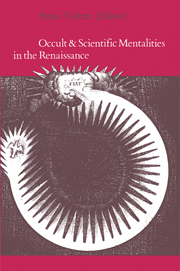Book contents
- Frontmatter
- Contents
- List of contributors
- Editor's preface
- Introduction
- 1 At the crossroads of magic and science: John Dee's Archemastrie
- 2 The occult tradition in the English universities of the Renaissance: a reassessment
- 3 Analogy versus identity: the rejection of occult symbolism, 1580–1680
- 4 Marin Mersenne: Renaissance naturalism and Renaissance magic
- 5 Nature, art, and psyche: Jung, Pauli, and the Kepler–Fludd polemic
- 6 The interpretation of natural signs: Cardano's De subtilitate versus Scaliger's Exercitationes
- 7 Kepler's attitude toward astrology and mysticism
- 8 Kepler's rejection of numerology
- 9 Francis Bacon's biological ideas: a new manuscript source
- 10 Newton and alchemy
- 11 Witchcraft and popular mentality in Lorraine, 1580–1630
- 12 The scientific status of demonology
- 13 “Reason,” “right reason,” and “revelation” in midseventeenth-century England
- Index
10 - Newton and alchemy
Published online by Cambridge University Press: 12 January 2010
- Frontmatter
- Contents
- List of contributors
- Editor's preface
- Introduction
- 1 At the crossroads of magic and science: John Dee's Archemastrie
- 2 The occult tradition in the English universities of the Renaissance: a reassessment
- 3 Analogy versus identity: the rejection of occult symbolism, 1580–1680
- 4 Marin Mersenne: Renaissance naturalism and Renaissance magic
- 5 Nature, art, and psyche: Jung, Pauli, and the Kepler–Fludd polemic
- 6 The interpretation of natural signs: Cardano's De subtilitate versus Scaliger's Exercitationes
- 7 Kepler's attitude toward astrology and mysticism
- 8 Kepler's rejection of numerology
- 9 Francis Bacon's biological ideas: a new manuscript source
- 10 Newton and alchemy
- 11 Witchcraft and popular mentality in Lorraine, 1580–1630
- 12 The scientific status of demonology
- 13 “Reason,” “right reason,” and “revelation” in midseventeenth-century England
- Index
Summary
On the whole, Newton preferred not to publicize his involvement in alchemy. Unlike his other major pursuits, nothing of his alchemy, or at least nothing explicitly labeled as alchemy, appeared in print during his lifetime or in the years immediately following his death. A few people did know about it. A fascinating correspondence between Newton and John Locke following the death of Robert Boyle reveals that the three men, possibly the last three men from Restoration England whom one would have expected, only a generation ago, to find so engaged, exchanged alchemical secrets and pledged each other to silence. John Conduitt, the husband of Newton's niece, who gathered material about his life, knew of his experiments in Cambridge and reported that his furnace there remained an item of curiosity shown to visitors. Nevertheless, the adjective Conduitt used was “chymical,” not “alchymical,” and in a similar manner knowledge of Newton's interest in the art quickly sank from view. When David Brewster found alchemical manuscripts in Newton's own hand among his papers, he was appalled and quickly dismissed them as a curious relic of an earlier age. It waited until the twentieth century for the record to become public, with the auction of the papers still in the hands of the Portsmouth family, and for scholars to come to grips with it. Lord Keynes purchased some of the alchemical papers at the auction and insisted forcefully on their importance, but only in our own generation have scholars ready to take the papers seriously systematically studied the entire corpus, or rather that part – well over 90 percent – of the corpus known to exist that is available to the public.
- Type
- Chapter
- Information
- Occult Scientific Mentalities , pp. 315 - 336Publisher: Cambridge University PressPrint publication year: 1984
- 9
- Cited by



